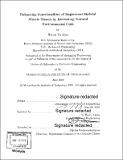Enhancing functionalities of engineered skeletal muscle tissues by recreating natural environmental cues
Author(s)
Kim, Hyeon Yu,Ph.D.Massachusetts Institute of Technology.
Download1117713977-MIT.pdf (11.16Mb)
Other Contributors
Massachusetts Institute of Technology. Department of Mechanical Engineering.
Advisor
H. Harry Asada.
Terms of use
Metadata
Show full item recordAbstract
Engineered skeletal muscle tissue is a three-dimensional contractile tissue made from muscle cells and the extracellular matrix (ECM). It can be used as a drug testing platform or an implantable tissue, but its practical use has been limited by inferior contractile performance and small size compared to natural muscles. This thesis aims to implement environmental cues and essential elements of natural muscles to improve the contractile performance and increase its size beyond the diffusion limit. Firstly, inspired by the observation that the natural muscles are exposed to electric potentials from neurons in combination with mechanical stretching from surrounding muscles, a new muscle training system was developed to apply coordinated electrical and mechanical stimulation. Both the experimental results and the mechanistic model suggest the combined stimulation reorients the ECM fibers in such a way that the parallel ECM stiffness is reduced, while the serial ECM stiffness is increased, which reduces resistance to muscle contraction and increases force transmission in the engineered muscles, respectively. Secondly, large-sized natural muscles are fully vascularized so that oxygen and nutrients can be supplied. However, vascularization of the engineered skeletal muscle has been challenging because the microenvironmental requirement for differentiating myoblasts is incompatible with the one for culturing endothelial cells. In contrast, the natural muscle tissue has a compartment structure, where endothelial cells are exposed to blood plasma, while myoblasts are surrounded by interstitial fluid. In this thesis, we modeled the natural fluid compartments by creating an in vitro perfusable vasculature running through a skeletal muscle tissue with physiologic cell density. The tissue is designed to have a coaxial tubular shape with a perfusable vasculature at the center. Through the in vitro fluid compartments, endothelial cells are exposed to endothelial cell growth medium running through the vascular channel, and the skeletal muscle cells are surrounded by muscle differentiation medium. By using this platform, engineered muscle tissue was successfully scaled up from microscale to subcentimeter scale. This platform also enabled to show that coculturing with the two separate media from an early stage of muscle differentiation leads to increased contractile force, thicker myotubes, and more muscle differentiation compared to using a single coculture medium. Furthermore, the engineered skeletal muscles were further vascularized by inducing angiogenic sprouting from the vascular channel penetrating into the muscle tissue. This thesis will contribute to utilizing engineered skeletal muscles in practical applications with improved functionalities and provide a new model to study heterotypic cell-cell interactions in skeletal muscle tissues.
Description
Thesis: Ph. D., Massachusetts Institute of Technology, Department of Mechanical Engineering, 2019 Cataloged from PDF version of thesis. Includes bibliographical references (pages 101-112).
Date issued
2019Department
Massachusetts Institute of Technology. Department of Mechanical EngineeringPublisher
Massachusetts Institute of Technology
Keywords
Mechanical Engineering.